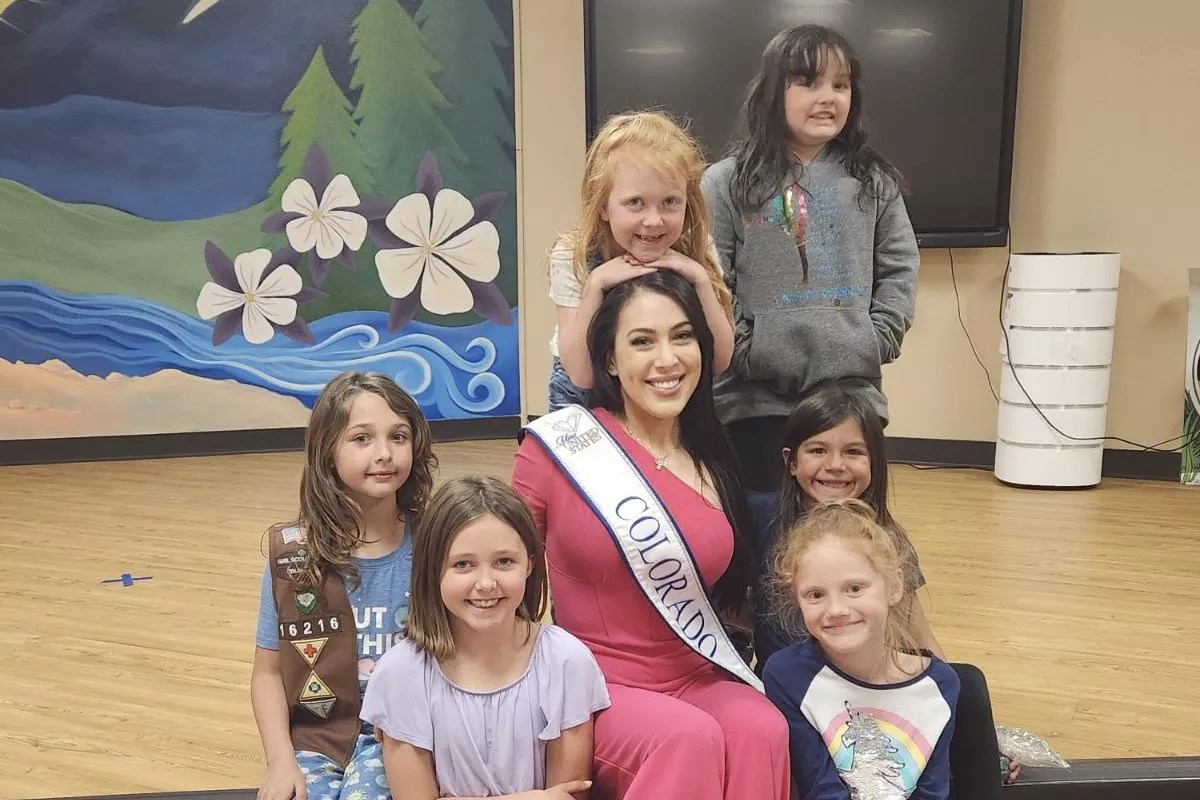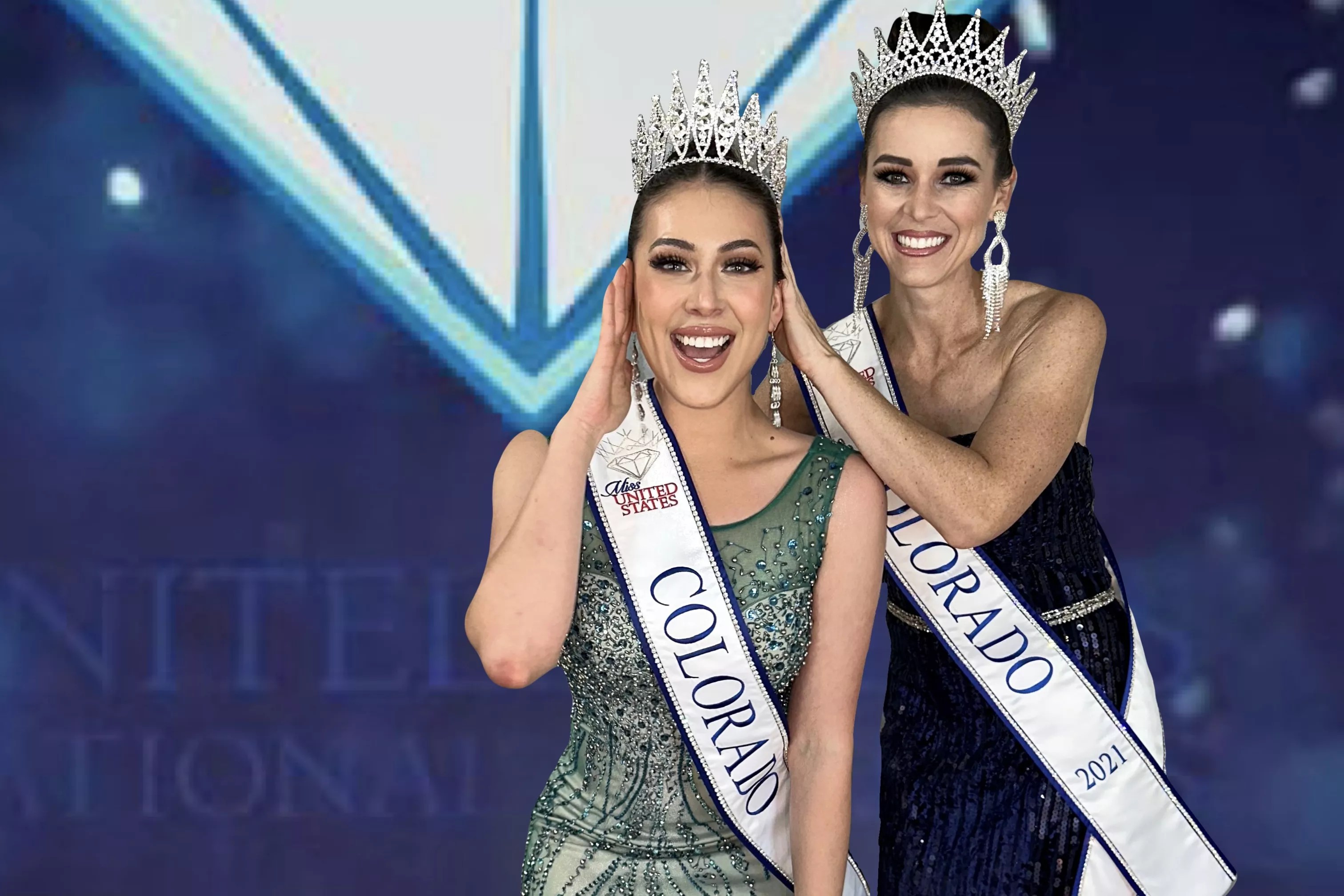
DB Focus Photography

Audio By Carbonatix
Mariana Fong, the reigning Miss Colorado, believes she can help restore trust in law enforcement by bringing cops to Denver high schools so that they can teach teens how to talk to police, but other local criminal justice advocates aren’t sold yet.
Representing Douglas County, Fong is the first Mexican-American and bilingual winner of Miss Colorado for the Mrs. United States National Pageant system, a competition that is separate from the Miss USA and Miss America pageants.
But before she won her crown in September 2023, Fong started a nonprofit in February 2023 named Resilient Rising to support youth in the Denver metro area with tutoring, mentorship and a “confidence-building” club for teenage girls and young women. About 300 kids and teenagers have gone through Resilient Rising programs. The nonprofit has worked with students from Overland High School in Aurora and Abraham Lincoln and East high schools in Denver, as well as Fong’s alma mater, Ponderosa High School in Parker.
Fong will have to give up the crown on December 15 after this year’s Miss Colorado competition takes place. Once she does, she plans to add new programs to Resilient Rising, and the one she’s most passionate about will teach students from Denver’s Lincoln and East high schools how to interact with law enforcement.
“We’re going to go over drills and how to go about a situation if you get into trouble, how to maybe not talk back, maybe be a little more respectful,” she says. “Part of the problem of why these kids are getting in trouble is because they don’t have that education at home.”
Three officers from the Denver Police Department are volunteering to lead two-hour lessons after school for six weeks, starting either on February 9 or 12, according to Fong. Her goal is to have at least twenty kids in the program’s first run, and expects most participants to be Black or Hispanic, based on the schools’ demographics.
“The program objective is to educate you on your rights and responsibilities when talking to law enforcement, to foster the relationship between the youth and them,” Fong says. “I also want to teach them communication skills, conflict resolution skills, because to me, it’s important to work on your gestures. If you do get pulled over, I want to show them what you need to do: your rights, you can remain silent, you can ask for a lawyer.”
The program will reenact scenarios like traffic stops or getting questioned by an officer, and students will practice “calm responses” as officers “teach strategies that can de-escalate potential very bad situations,” Fong says.
“Even adults have bad facial expressions, and officers take it as they’re not being compliant or they’re being rude,” she says. “That’s how you escalate the situation, so something I want to teach is staying calm and working on facial expressions.”
The classes will teach students their constitutional rights, including protections from unreasonable searches and seizures, their Miranda Rights and the right to a trial by jury. Students will also get the chance to ride along with a police officer, Fong says.
“Some of them, after having positive relations with law enforcement, they might want to go into the law enforcement field,” she says. “That’s part of what Resilient Rising does, is teach them there are other ways to make money if you don’t go to college.”
Fong expects the class to “build positive relationships” between cops and kids and to “encourage the youth to view law enforcement as a community partner, as someone you can reach out to if you need help,” Fong says. She also wants to create a space for DPD officers to listen to how the students feel, with one session being devoted to students asking questions and sharing stories of negative experiences with law enforcement.

Mariana Fong from Douglas County won Miss Colorado in 2023.
Courtesy of Mariana Fong
“I want to give the kids a chance to speak and show how they feel,” she says. “I want the law enforcement to know what these kids’ worries are, so they can go back to their department and hopefully vocalize that.”
For now, Fong only plans on doing the program once a year, but she hopes to continue it beyond 2025. Denver Public Schools is the only district that has approved the program so far, she says, but she’s pitched it to Overland High School and Cherry Creek School District, as well. If she can get more volunteers and support, Fong wants to expand it as far as Grand Junction and Englewood.
Fong grew up in Parker and got the idea for her community program when her brothers kept getting into trouble with local law enforcement after their father was violently killed about a decade ago. Their mother worked three jobs, and they were suddenly without a parent in their life, she says.
“That created a lot of anger,” she explains. “When my dad passed away, I think they started hanging out with the wrong people, with the wrong crowd, and eventually they started to get in trouble with law enforcement. I feel like they let some of their frustration out on law enforcement or had a little bit of an attitude.”
But Fong is broaching one of the touchiest subjects across the country and in the Denver area. Fresh in the mind of local residents is the death of Elijah McClain in police custody; his forced ketamine overdose in 2019 led to prison sentences for two paramedics and an Aurora Police officer. While carrying out a surprise arrest warrant earlier this year, Aurora Police shot and killed Kilyn Lewis while he was reaching for his phone, which has since resulted in protests that have halted Aurora City Council meetings.
Activist Auon’tai Anderson, an advocate for police reform and former vice president of the Denver Public Schools school board, says a program like Fong’s should keep in mind how Black and Hispanic communities feel about law enforcement.
“I want us to be realistic in the reality of what it means to be Black or Brown and encounter law enforcement,” Anderson says. “I’m 26 years old, and every time a cop is behind me, regardless of if they’re pulling me over of not, I’m scared. I don’t want to necessarily have orientation on what faces I should make or how I should have my hands gestured. I should be able to trust that whenever I encounter law enforcement, they’re not going to pull their gun out and shoot me.”
The Colorado Criminal Justice Reform Coalition, a nonprofit advocacy group, is concerned that the program seems to imply teenagers are the ones who need to change, says spokesperson Jennifer Dillon, who argues that people should be instead asking for systemic reform and holding law enforcement to higher standards .
“While the intent to foster safer interactions with law enforcement may seem well-meaning, this approach raises serious concerns about victim-blaming,” Dillon says. “Teaching youth how to speak to avoid police violence is as problematic as teaching women to dress ‘appropriately’ to avoid sexual assault. Both unfairly place responsibility on victims rather than addressing the root causes of harm. No one, especially teenagers, should have to suppress natural emotions like fear, frustration and anger to avoid violence from those sworn to protect them.”
Fong is aware that police violence and racial bias are thorny issues, but says her “goal is just to create a friendly environment.
“It doesn’t matter what race you are,” she adds. “Being compliant and being polite and basically doing what’s expected of you, regardless of who the officer is or what race you are, will always, always give you a positive impact and positive result.”
For anyone who has their doubts, Fong invites them to come see the program in action, as adults can watch or even participate in the program any time during the six weeks by reaching out to Resilient Rising. Parents of students at Abraham Lincoln and East high schools will get a mass email in January detailing more about the program, she adds.
“Come to an after-school session. You don’t have to stay the whole two hours, but stay an hour,” she says. “Just show up. If you don’t like it, you can leave, but give it a try.”